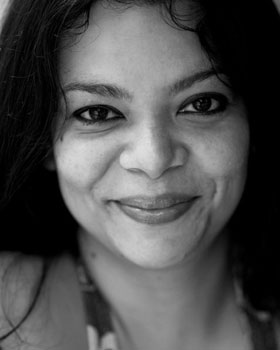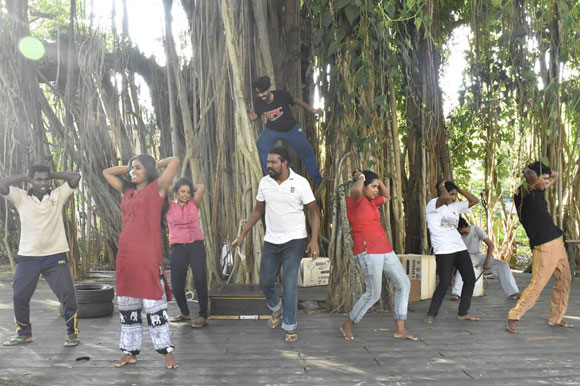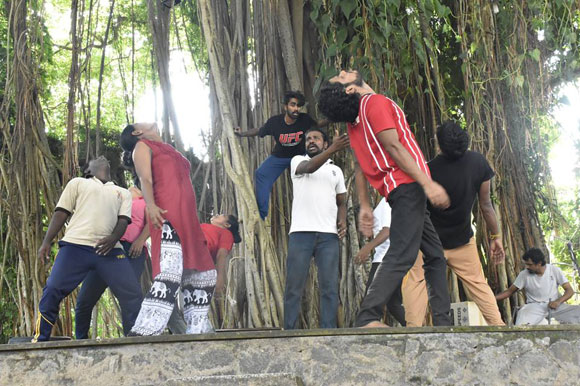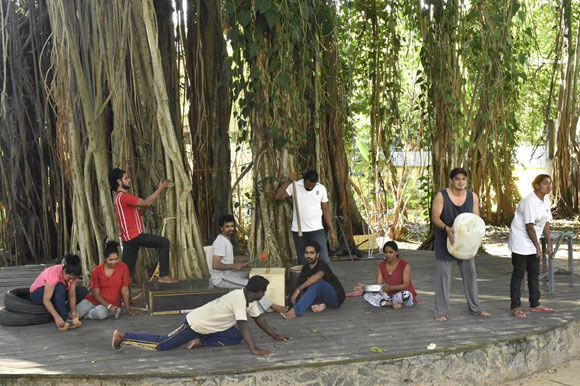May 13 2016.
views 664Kaerakena Keliya begins this month
On the 31st of this month, Mind Adventures Theatre Company in collaboration with the Janakaraliya theatre troupe presents ‘Kaerakena Keliya’. The show is based on ‘The Travelling Circus’ which was first performed by Mind Adventures in 2009. The new production is directed by Tracy Holsinger and will be staged in both Sinhala and Tamil.
Adapted and devised from ‘The Boy Who Speaks In Numbers’ by Mike Masilamani, the original production of ‘The Travelling Circus’ used humour and physical theatre to explore the themes of displacement, alienation and the collateral damage of war. We spoke to Tracy Holsinger – Artistic Director, Mind Adventures about the new production and what audiences can expect to see this time around.

You first performed The Travelling Circus in 2009. How much have the issues focused on in the play changed? Or haven't they?
The main issue at the time was the IDP camps and the thousands who were detained for so long. Seven years on, while this is still an issue, the focus of this production is now to raise awareness about missing persons and to promote communal tolerance. Recent reports state that there may be as many as 22,000 persons still unaccounted for.
The original Travelling Circus was met with somewhat disparate reviews. A fact that was unsurprising given the topics dealt with. Do you think this version will be judged more evenly this time around?
I think some people weren’t ready for the Brechtian treatment of the material so soon after the war. At the time, I could find no other way to talk about the issues and deliver a message of hope and reconciliation without using his techniques to create a bit of distance from such an emotionally charged topic. The play’s content is still controversial but at the very heart of it, is a story that is as heartwarming as it is sorrowful and poignant. I am very interested in transitional justice and memorialization, and in a post-war context, it is vital that theatre creates space for new narratives and dialogue and challenges people to think about reconciliation by telling stories that deal justly with victims and victors alike; this is how we begin to move forward.

The Janakaraliya Troupe is famous for being, quite literally a travelling theatre company; bringing the theatre itself to the people rather than the people to a theatre. How will this concept work in Colombo?
The Sinhala production will be staged at the Nuga Sevana open-air theatre, which is located on the grounds of the Anglican cathedral on Bauddhaloka Mawatha. This is where the English production was first staged in 2009, and it has a strong emotional significance for me. It is utterly atmospheric, and the circular stage is built around a massive Banyan tree. I took the Janakaraliya cast to see it, and they absolutely loved it. The Tamil show will be staged in Janakaraliya’s mobile theatre in Jaffna. Once we secure enough funding, both versions of the show will tour the country in the mobile theatre.
In 2009, The Travelling Circus represented your theatre company's first foray into the realm of devised theatre. 7 years later, devised theatre is something that is synonymous with Mind Adventures. How has your experience of working with this medium changed over time?
At the time, we had no idea what we were doing. We literally just researched the techniques and tried to make something in accordance with what we learned. Since then, we have learned more about ourselves as a company just from continuing to experiment with the form, trusting the process and never giving up. – even though it seemed at times that we simply did not have a show. One thing I realised was that we desperately needed a playwright, which I am not. When my deputy Arun Welandawe-Prematilleke returned from having specialized in devised and immersive theatre, it was a huge boon for us, as he has really developed as a writer. We now have a procedure in place that has allows us to create original work within weeks as opposed to the months it used to take us.

In the original production you stayed relatively true to ‘The Boy Who Speaks In Numbers’ by Mike Masilamani. Is that still the case?
We changed the play in 2011. We were invited to tour India with it, and felt we needed to provide more situational context. So we used the ‘play within a play’ device. The Travelling Circus became a group of refugees who were making aliving by travelling around the country and staging ‘The Boy Who Speaks In Numbers’ as a play. At various points in the show, the ‘play’ is stopped as the characters speak of their experiences during the war – these stories were taken from eyewitness accounts published in the Human Rights Watch Report of 2009. This version got very positive reactions from the Lankan and Indian audiences that saw it, so I decided to stick with the format. This time around, the ‘play’ is performed by a rag tag group of survivors who are either looking for their missing loved ones or who have a good reason to keep moving around. These new narratives have been created from missing person stories reported online and also from actual accounts told to the Janakaraliya troupe. As you know, their work is focused on raising social awareness of human rights issues and they never stopped touring the country – even at the height of the war.
Clearly this is not simply a translation of the original script. How did you and the new cast go about creating the show?
Before beginning work on the play, I did a series of devising workshops with the cast, which was also a process of learning how they work and introducing them to how I work. We did a lot of work on absurdist techniques as well. Once this was done, I asked my cousin Ryan Holsinger to translate the English script of ‘The Boy Who Speaks In Numbers’ into Sinhala. It is a difficult process, as it is not just a case of direct translation, especially with the songs – the challenge was to make it truly vernacular. We rewrote all the songs and melodies with the cast, working in particular with Sumudu Mallawaarachchi and Rasaiah Loganandan. We’ve also reworked all the dance sequences. Under my direction, each individual cast member has developed the additional dialogue in which the characters talk about their real experiences. Now that the Sinhala script is complete, Rasaiah Loganandan will translate it into Tamil.
Mind Adventures recently worked with the Stages Theatre Group and Rwandan theatre group Mashirika to present Dear Children Sincerely and A conversation across generations. What are the advantages of these sort of collaborations?
An exchange of knowledge and ideas. Finding common ground through shared experiences. Rwanda, like us, has emerged from a terribly divisive conflict, and like us, is working towards reparation and reconciliation. From Cambodia to Bosnia to Rwanda to Sri Lanka, productions have been staged internationally with one main goal in mind - to inculcate the preventative lesson of 'never again' for our future generations. The world turns so fast, and even now, we run the risk of forgetting the horrors faced by all communities in our country. So we must document and preserve our past, and learn how to move forward from shared experiences and insights. There are organisations in Sri Lanka that are already doing this. We are adding to global evidence and initiatives, which seems to me a wonderfully positive step in the right direction.
The importance of memorialization, for instance, as a powerful form of social reconstruction and transitional justice has been endorsed severally and enacted widely on the global stage. Memorializing is a basic human right. In Sri Lanka, there are thousands of families who do not even have a grave by which to remember their loved ones.
The Janakaraliya group is known for producing their dramas in both Sinhala and Tamil. Is this your first time working in these languages, and what has that been like?
Huge learning curve! My Sinhala has improved greatly, much to my joy, and I have picked up quite a bit of Tamil as well. That is what is so wonderful about this collaboration – I’m learning as much as I am giving direction.

How did this collaboration come about? Also tell us about the actors you are working with?
I met Janakaraliya’s Artistic Director Parakrama Niriella at a meeting organized by Chandrika Kumaratunge at the Office for National Unity and Reconciliation (ONUR) late last year. The intention was to encourage artist collaboration in creating work focused on reconciliation. I have long admired Janakaraliya, so I approached Parakrama about working together on this show and he very kindly agreed. In fact, he took it one step further, and we are staging the play in Sinhala and Tamil, and have designed a series of workshops around the themes in the play that we hope to conduct in schools across the country. I am working with the Janakaraliya main acting troupe – Sumudu Mallawaarachchi, Rasaiah Loganandan, Ronika Chamalee, Selvaraj Leelawathy, Nishantha Kularatne, Thiyagaraja Sivanesan, Ajanthan Shanthakumar, Devran Sri Livera, Arosha Tharanganie and Inoka Lankapura. If it is possible to fall in love with an entire company, I have. They are gifted and inspiring and the hardest working actors I have ever met.
This has been a busy year for Mind Adventures. What else can we expect to see from the company in 2016?
We are hosting a season of 5 original plays written and Directed by Arun Welandawe-Prematilleke in November this year at the Punchi Theatre. These comedies were developed during our time as Artists in Residence at The British Council 2015/16. We want to share the work with a larger audience now and are very excited about the pieces as they mainly focus on life in Lanka.
In June this year, we are collaborating with The British Council, Sri Lanka and The British Council Northern Ireland to create a new show that looks at the similarities between our two conflicts. We’re also looking forward to the prospect of collaborating and creating new work with local and international artists for the Colombo Art Biennale, which will be November and December this year.
The Janakaraliya Cultural Foundation and Mind Adventures theatre company present Kaerakena Keliya on 31stMay at the Nuga Sevana amphitheatre (Colombo Cathedral grounds). Tickets are priced at Rs. 200, and email [email protected] to reserve them.
0 Comments